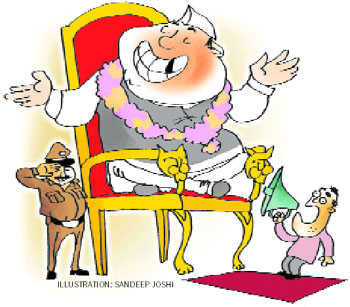
Madabhushi Sridhar
A popular government without popular information or the means of acquiring it is but a prologue to a farce, or a tragedy or perhaps both”, says James Madison, political theorist and an American statesman who served as the fourth President of the United States (1809-17). If a democratically elected minister does not provide time at least once a month to meet his voters and listen to their woes, representative democracy has no meaning. I remember N. Yethiraja Rao, a minister in NT Ramarao's cabinet during 1984-89, who used to carry two suitcases with him. When asked about this, he opened one containing nothing but “representations” of voters from the village. He never threw them out or left them in the guesthouses. He addressed the officers, visited public offices in mandal, district and state headquarters to resolve those grievances. He also gave the feedback after meeting each of those who gave those representations. A voter, Hemanth, sought to know, through the RTI, from the Minister for Law and Justice, “Whether any time is scheduled for common people to meet the cabinet minister and minister of state in the minister's office in the Mantraalay (Secretariat)? If yes, please inform the timing of meeting the minister, both in English and Hindi”.
The Public Information Officer of the Ministry of Law and Justice replied, citing information sent by the minister’s office that no specific time was given for general public to meet the minister. However, as and when requests are received, appointments are given subject to the minister’s convenience. Even Maryada Purushottam Ram had installed a bell in front of his palace. Whenever anyone rang it, he would come out to meet the citizen and listen to him. This reflected the grievance-redressal mechanism in Ram rajya. Indian forts had built-in durbar halls where Mughal and Rajput emperors met and heard submissions of their subjects at a stipulated hour. And those were dictatorial regimes. In democratic governance too people heard and saw how some prime ministers, chief ministers and ministers held janata darbars (public meetings) to receive people's representations/complaints. Subject to availability and convenience, the minister owes a moral and democratic responsibility to meet his voters in the constituency. It will be in fitness of democratic requirements that every minister makes it a regular practice — once, twice or thrice in a week or in a month so that he/she is available for meeting people at a scheduled hour for people-oriented decision making and hearing the grievances of the public. The minister can also publish the dates of his meeting, according to a schedule as per his choice. It is the democratic right of voters to meet him and also his duty to meet voters. This will go a long way in achieving the objectives of good governance through transparency, as envisaged by the RTI Act. Extending it logically, this duty includes a genuine responsibility of the office of the Minister for Law and Justice/Minister of State (not the Ministry) to inform the people when they could meet him. This is a facility that they are expected to provide to the people who elected them.
The information about such a facility should be disclosed voluntarily by the office of the minister, under Section 4(1) (b), within 120 days from the date of commencement of law. If there is no such facility of meeting, the Minister's office should declare that “there is no such facility” in a particular week, fortnight, month, year, as required under Section 4 (1) (b). The people have a right to an appointment with the minister. Section 4 (1) (b) (xv) says: “The particulars of facilities available to citizens for obtaining information….” It is pitiful that a citizen has to file a RTI request to know the timings and process of meeting the chosen minister. This should have been ordinarily provided by the minister’s office on its own. The minister or his office alone is the appropriate authority to decide and inform about the facility of meeting the minister, with details like days and timings, and also about the process of seeking appointment. In a nation whose motto is “Satyamev Jayate”, the ministers under the leadership of the Prime Minister and respective chief ministers, have a moral responsibility to realise their promises, including giving access, truthfully.
It needs no mention that in a welfare state, a minister is a key functionary being in charge of a portfolio, or group of departments in a ministry. Instead of leaving it to individual discretion, the law should mandate the transparency, including the information about facilitating the “meeting” with people. (From my decision in Hemanth Dhage vs Ministry of Legal Affairs on March 12, 2016)
The writer is a Central Information Commissioner.



























